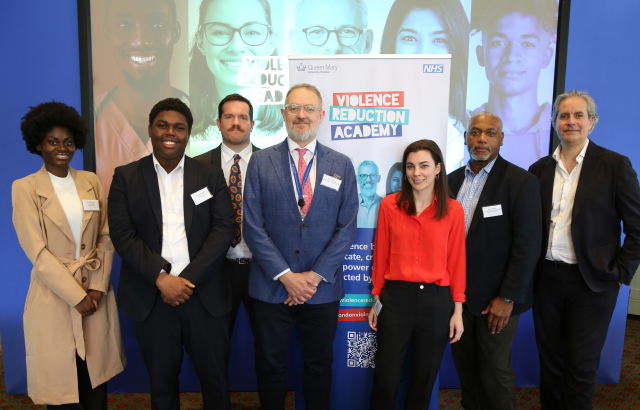Queen Mary University Of London, NHS London Violence Reduction Programme launch new Violence Reduction Academy
Violence affecting young people is rarely out of the headlines, but in the news, it is usually framed as a law-and-order issue. How the Violence Reduction Academy differs is that it is taking a public health approach to addressing interpersonal violence challenges.
The new initiative aims to build evidence and share best practice around ways to reduce violence, supporting the health system to implement them across the capital.
The launch of the academy took place at an event in Central London on Thursday 8 June.
The keynote speaker was Prof Karim Brohi, Clinical Director of the London Major Trauma Network and Professor of Trauma Sciences at Queen Mary University.
“The idea for this started from a conversation in a GP’ surgery in Bromley by Bow asking how can we join the dots to make things better? When I started as a consultant at the Royal London Hospital in 2006, we would see one to two stabbings a week. Now the Royal London sees over a thousand stabbings every year. And that is replicated in our 30 plus trauma units across London.
“It’s become clear that stitching people up is not enough, and we have a vocational duty as healthcare providers to try and fix the whole person. And if we can’t do that fixing ourselves, then to advocate and work with people who can help.
“Like all diseases we have a duty to the public health to try and prevent diseases happening in the first place. But violence can seem like an overwhelming proposition because so much of it is based in society. When you change violence from a criminal issue to a societal, public health issue then you have the opportunity to make change at all sorts of levels.”
The academic side of the partnership is led by Dr Sania Shakoor, Dr Mark Freestone and Dr Heather McMullen who are all based at Queen Mary’s Wolfson Institute of Population Health (WIPH).
“We are uniquely placed at the Wolfson Institute of Population Health as we are a very interdisciplinary team,” explained Dr Freestone. “We have a mix of medics, clinicians, psychologists, public health experts and campaigners. Our role at the Violence Reduction Academy is to gather evidence and put it all together in a meaningful way and to communicate it through a community of practice.”
Dr McMullen said:
“This is research for action – we need to have a better understanding of the evidence to drive the action so it can make a difference. And it needs to have real world impact
“All this work is happening because of injustice and inequality, and we understand violence to be an acute expression of those things, and that’s why we support the public health approach. We are social justice oriented – we are trying to make a better world for young people, where there is less violence, where there is more well-being and where we are reducing health inequalities.
“There is so much creative, innovative and inspiring work going on. The role that we are taking on, is gathering what people are already doing and synthesising and amplifying that, so it gets into spaces where it’s needed, and can really reflect the creativity, innovation and expertise that we already see happening in this space.”
The aim is to work with a wide range of organisations, including Integrated Care Systems, NHS Trusts, primary care, third sector organisations, local government, universities and Royal Colleges, Government offices and community interest groups.

